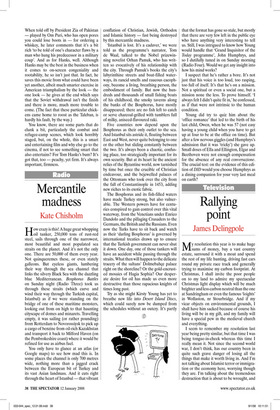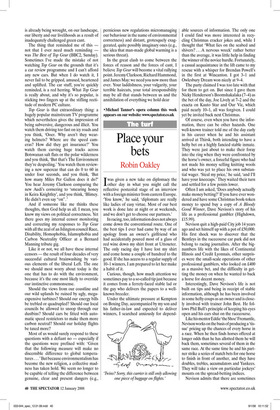Rallying point
James Delingpole
My resolution this year is to make huge sums of money, buy a vast country estate, surround it with a moat and spend the rest of my life hunting, driving fast cars round my private race track and generally trying to maximise my carbon footprint. At Christmas, I shall invite the poor people on to my land to admire my spectacular Christmas light display which will be much brighter and less carbon neutral than the one at Sandringham or even the famous ‘loights’ in Wollaston, nr Stourbridge. And if my vicar objects on environmental grounds, I shall have him sacked because of course his living will be in my gift, and my family will have a special pew in the medieval church and everything.
I seem to remember my resolution last year being pretty similar, but that time I was being tongue-in-cheek whereas this time I really mean it. Not since the second world war, I don’t think, has our country been in quite such grave danger of losing all the things that make it worth living in. And I’m not talking about Islamist terror or immigration or the economy here, worrying though they are. I’m talking about the tremendous destruction that is about to be wrought, and is already being wrought, on our landscape, our liberty and our livelihoods as a result of inadequately challenged green cant.
The thing that reminded me of this — not that I ever need much reminding — was The Best of Top Gear (BBC2, Sunday). Sometimes I’ve made the mistake of not watching Top Gear on the grounds that it’s a car review programme and I can’t afford any new cars. But when I do watch it, I never fail to be gripped, amused, heartened and uplifted. The car stuff, you’re quickly reminded, is a red herring. What Top Gear is really about, and why it’s so popular, is sticking two fingers up at the stifling rectitude of modern PC culture.
Top Gear is that extraordinary thing: a hugely popular mainstream TV programme which nevertheless gives the impression of being subversive, dangerous and illicit. You watch them driving too fast on icy roads and you think, ‘Ooer. Why aren’t they wearing helmets? Where are the speed cameras? How did they get insurance?’ You watch them carving huge tracks across Botswanan salt flats or the polar wilderness and you think, ‘But that’s The Environment they’re despoiling.’ You watch them reviewing a new supercar that can do 0 to 60 in under four seconds, and you think, ‘But how many Miles Per Gallon does it do?’ You hear Jeremy Clarkson comparing the new Audi’s cornering to ‘smearing honey in Keira Knightley’, and you think, ‘Blimey. He didn’t even say “on”.’ And if someone like me thinks these thoughts, then God help us all. I mean, you know my views on political correctness. Yet there goes my internal censor monitoring and correcting my responses to Top Gear with all the zeal of an Islington council Race, Disability, Homophobia, Islamophobia and Carbon Neutrality Officer at a Bernard Manning tribute gig.
Like it or not, we all have these internal censors — the result of four decades of very successful cultural brainwashing by various elements of the liberal Left. The one we should most worry about today is the one that has to do with the environment, because it’s the one most likely to override our instinctive commonsense.
Should the views from our coastline and our wild uplands be ruined by ugly, megaexpensive turbines? Should our energy bills be trebled or quadrupled? Should our local councils be allowed to snoop through our dustbins? Should cars be fitted with automatic speed restrictors to make them more carbon neutral? Should our holiday flights be taxed more?
Most of us would surely respond to these questions with a defiant no — especially if the questions were prefixed with: ‘Given that the following measure will make no discernible difference to global temperatures ... ’ But because environmentalism has become the new religion, a collective madness has taken hold. We seem no longer to be capable of telling the difference between genuine, clear and present dangers (e.g., pernicious new regulations micromanaging our behaviour in the name of environmental correctness) and distant, grotesquely exaggerated, quite possibly imaginary ones (e.g., the idea that man-made global warming is a serious threat).
In the great clash to come between the forces of reason and the forces of cant, I believe Top Gear will become a vital rallying point. Jeremy Clarkson, Richard Hammond, and James May: we need you now more than ever. Your laddishness, your vulgarity, your terrible haircuts, your total irresponsibility may be all that stands between us and the annihilation of everything we hold dear • Michael Tanner’s opera column this week appears on our website: www.spectator.co.uk



























































 Previous page
Previous page